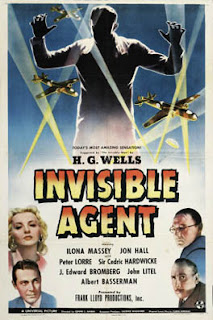Invisible Agent
In 1942, Universal took the Invisible Man character and made him a hero, cast in a typical World War II propaganda film, Invisible Agent, written by Curt Siodmak with a special indemnity against Nazis (and the Japanese, as well).
The original Invisible Man, Griffin, somehow had a grandson despite dying before marriage. He's changed his name and runs a printing shop. But he's tracked down by Axis agents and offered money for the invisibility formula, which they somehow are sure he has (I certainly don't know all my grandfather's secrets). They're right, but he escapes their clutches. After Pearl Harbor, he decides to give the formula to the U.S., but on the condition that he is the only one to use it.
The result is a passing adventure, though this new Griffin, played by Jon Hall with a kind of goofy charm that was the style of Joel McRea, nearly bungles the whole thing. Once in Berlin, he uses his invisibility to play practical jokes more than anything else, ruining the work of a German spy (Ilona Massey) and managing to get another resistance fighter tortured. Still, he out maneuvers the enemy, embodied by Cedric Hardwicke as a Nazi and Peter Lorre as a Japanese diplomat.
I found the most interesting character to be played by J. Edward Bromberg as the head of the German Secret Police. He lusts after Massey, and becomes the butt of Hall's tomfoolery, and eventually is arrested and sentenced to be executed because Massey is Hardwicke's woman. Hall visits him in his cell, and gets him to talk, and this is where Siodmak puts his jeremiad against National Socialism. But Bromberg shifts with the prevailing wind, and it's his character arc that puts this film slightly above the average.
The film was nominated for an Oscar for visual effects. By now, they could have the character invisible but covered in soap film, or allowing his features to be seen by covering his face in cold cream (though they erred in allowing his teeth to be visible).
The original Invisible Man, Griffin, somehow had a grandson despite dying before marriage. He's changed his name and runs a printing shop. But he's tracked down by Axis agents and offered money for the invisibility formula, which they somehow are sure he has (I certainly don't know all my grandfather's secrets). They're right, but he escapes their clutches. After Pearl Harbor, he decides to give the formula to the U.S., but on the condition that he is the only one to use it.
The result is a passing adventure, though this new Griffin, played by Jon Hall with a kind of goofy charm that was the style of Joel McRea, nearly bungles the whole thing. Once in Berlin, he uses his invisibility to play practical jokes more than anything else, ruining the work of a German spy (Ilona Massey) and managing to get another resistance fighter tortured. Still, he out maneuvers the enemy, embodied by Cedric Hardwicke as a Nazi and Peter Lorre as a Japanese diplomat.
I found the most interesting character to be played by J. Edward Bromberg as the head of the German Secret Police. He lusts after Massey, and becomes the butt of Hall's tomfoolery, and eventually is arrested and sentenced to be executed because Massey is Hardwicke's woman. Hall visits him in his cell, and gets him to talk, and this is where Siodmak puts his jeremiad against National Socialism. But Bromberg shifts with the prevailing wind, and it's his character arc that puts this film slightly above the average.
The film was nominated for an Oscar for visual effects. By now, they could have the character invisible but covered in soap film, or allowing his features to be seen by covering his face in cold cream (though they erred in allowing his teeth to be visible).



Comments
Post a Comment